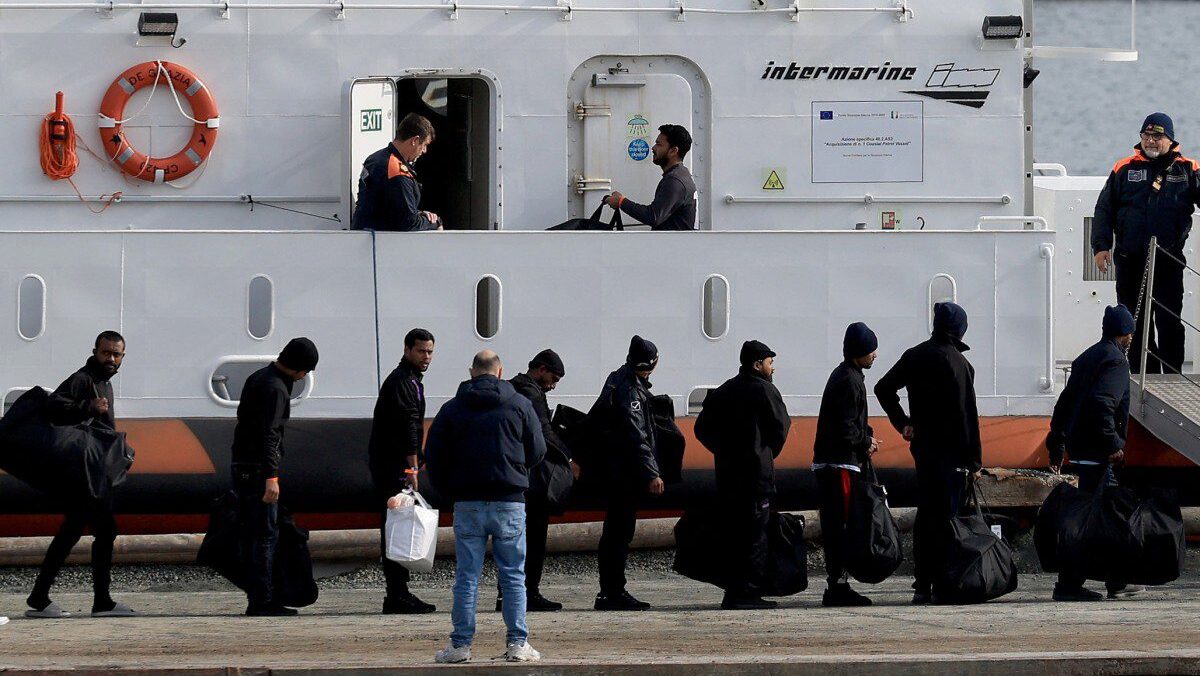
Illegal migrants embark on an Italian Coast Guard vessel in Shengjin, Albania, before being taken back to Italy on 1 February 2025.
Photo: Adnan Beci / AFP
Even though it seemed like Meloni finally won, the battle for primacy between the Italian government and judiciary is far from over.
At the end of last week, the Italian Court of Appeal ordered all remaining migrants in Albania’s Gjader reception center to be brought back to Italy, effectively sabotaging the country’s ‘Albania protocol’ for the third time in a row while actively disregarding new rules put into law by the government.
As we wrote before, the court initially ordered only seven of the 49 migrants who were brought to Albania, five minors and two adults in poor health. The remaining 42 migrants—34 Bangladeshis and eight Egyptians—were all healthy adult males and therefore qualified for detention in Albania until their asylum requests have been processed.
According to the new laws implemented by Giorgia Meloni’s conservative government, Italian courts can no longer invalidate the detention of a group of migrants as a whole—like they did in the previous two cases—but need to make individual decisions for each one of them.
The change was needed because in the previous cases, the Rome Civil Court claimed that the countries of origin—Bangladesh and Egypt—couldn’t be considered “safe” throughout their entire territory or for all citizens, regardless of where the migrants came from or whether they belonged to any persecuted category. If they couldn’t be deported even if their asylum claims are rejected, the argument goes, there’s no point in holding them in the facilities serving as accelerated repatriation centers.
This time, the court issued separate but completely identical rulings for each migrant, giving three reasons for the invalidation: that the EU Court of Justice (ECJ) was still deliberating whether the Protocol was legal; that it was impossible to make individual decisions under the 48-hour deadline required by law; and—just for good measure—that there was a risk of gender and sexuality-based violence in the migrants’ home countries, despite none of them claiming to belong to the LGBT community.
The other two arguments are similarly unfounded. It’s easy to miss the validation deadline if you don’t want to do it in the first place, while ongoing cases at the ECJ don’t require the legislation in question to be suspended, especially since rulings generally take months to arrive. The Italian government said this is why they weren’t expecting such a ruling, but vowed to “overcome this obstacle as well.”
Judge Silvia Albano, the head of the Italian judiciary’s dominant leftist faction, the Democratic Magistracy, even admitted that the courts are directly challenging the government’s authority and suggested that obeying the law was somehow contrary to the duties of the judges. “The judiciary that responded to the wishes of the majority of the day would be politicized,” Albano said, as if the laws passed by democratically elected officials had no place in the courtroom.
PM Meloni was not amused by the activist judges undercutting her for the third time while allowing the leftist opposition to declare the Albania protocol a “resounding failure” and an “extraordinary waste of taxpayer money,” as if it wasn’t the Left preventing the implementation.
“If some judges want to govern, they should run for elections and govern,” Meloni said, describing the decision as a “harm to the nation.”
Moreover, the leftist courts are not only undermining the authority of elected representatives by refusing to acknowledge the democratic will of the majority but also failing to realize that theirs has become a minority position in Europe as well.
Last fall, the EU member states in the European Council instructed the Commission to begin preparations to implement the Albania protocol at the EU level by establishing multiple third-country reception and deportation centers, funded by the EU budget. The von der Leyen Commission promised to explore the possibility, which means there’s (at least nominal) willingness even at the level of the EU executive.
Yet, the Italian judiciary is continuing its biased political crusade against the Meloni government and its voters, acting like it was just upholding laws—laws that don’t even exist.
